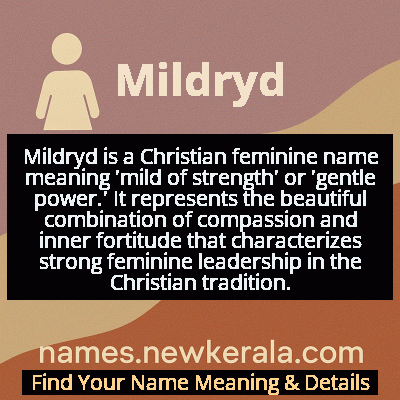Mildryd Name Meaning & Details
Origin, Popularity, Numerology Analysis & Name Meaning of Mildryd
Discover the origin, meaning, and cultural significance of the name MILDRYD. Delve into its historical roots and explore the lasting impact it has had on communities and traditions.
Name
Mildryd
Gender
Female
Origin
Christian
Lucky Number
4
Meaning of the Name - Mildryd
Mildryd is a Christian feminine name meaning 'mild of strength' or 'gentle power.' It represents the beautiful combination of compassion and inner fortitude that characterizes strong feminine leadership in the Christian tradition.
Mildryd - Complete Numerology Analysis
Your Numerology Number
Based on Pythagorean Numerology System
Ruling Planet
Uranus (Rahu)
Positive Nature
Strong sense of order, loyal, practical, and disciplined.
Negative Traits
Stubborn, overly serious, rigid, and prone to feeling restricted.
Lucky Colours
Blue, gray.
Lucky Days
Saturday.
Lucky Stones
Blue sapphire.
Harmony Numbers
1, 7, 8.
Best Suited Professions
Managers, engineers, accountants, organizers.
What People Like About You
Dependability, discipline, practicality.
Famous People Named Mildryd
Mildryd of Thanet
Anglo-Saxon Abbess
Founded Minster-in-Thanet Abbey and was venerated as a saint for her charitable works
Mildryd Johnson
Historian
Renowned scholar of medieval women's religious communities and Anglo-Saxon saints
Mildryd Evans
Educator
Pioneered women's education in Wales and established several girls' schools
Name Variations & International Equivalents
Click on blue names to explore their detailed meanings. Gray names with will be available soon.
Cultural & Historical Significance
The name's cultural significance extends beyond its religious origins to represent a distinctly English Christian identity. After the Norman Conquest, the name maintained its popularity as a symbol of native English sanctity and resistance to foreign influence. The cult of Saint Mildred remained strong throughout the Middle Ages, with her shrine at Canterbury becoming a major pilgrimage site. In modern times, Mildryd has become a symbol of cultural preservation and historical continuity, often chosen by families seeking to honor their English heritage while embracing Christian values of gentle strength and compassionate leadership.
Extended Personality Analysis
Women named Mildryd are typically characterized by their remarkable balance of gentleness and inner strength. They possess a quiet dignity and emotional intelligence that allows them to navigate complex social situations with grace and wisdom. Their 'mild' nature manifests as exceptional patience, deep empathy, and a nurturing disposition that makes others feel safe and understood. They are often the calm center in turbulent situations, using their diplomatic skills to resolve conflicts and bring people together.
At the same time, Mildryds possess a formidable inner strength that becomes apparent when principles are at stake. They are resilient in the face of adversity and possess strong moral convictions that guide their actions. This combination creates individuals who lead through inspiration rather than intimidation, who protect through wisdom rather than force, and who achieve through persistence rather than aggression. They often excel in caregiving professions, education, counseling, and community leadership roles where their balanced nature can benefit others. Their strength is the steady, reliable kind that builds trust and creates lasting positive impact in their communities.
Modern Usage & Popularity
In contemporary naming practices, Mildryd occupies a unique niche as a rare vintage name experiencing gradual rediscovery. While it remains outside the top 1000 names in English-speaking countries, it has seen increased usage among parents seeking distinctive names with deep historical roots and Christian significance. The name appeals particularly to families with Anglo-Saxon heritage, historical enthusiasts, and those in traditional Christian communities who appreciate its saintly associations. Modern Mildryds often benefit from the current trend toward vintage revivals and the growing appreciation for names that combine elegance with substance. The name's rarity makes it distinctive without being unfamiliar, and its clear pronunciation and spelling make it accessible despite its ancient origins.
Symbolic & Spiritual Meanings
Symbolically, Mildryd represents the powerful concept that true strength is found in gentleness and compassion. The name embodies the paradox of 'soft power' - the idea that influence and leadership can be exercised through kindness, wisdom, and moral authority rather than coercion or aggression. It symbolizes spiritual resilience, suggesting that the most enduring strength comes from inner peace and conviction rather than external force. Mildryd serves as a living metaphor for the Christian ideal of servant leadership, where authority is exercised with humility and power is used for protection and nurturing rather than domination. The name evokes images of ancient wisdom, quiet dignity, and the kind of strength that builds rather than breaks, that heals rather than harms, and that endures through changing circumstances.

